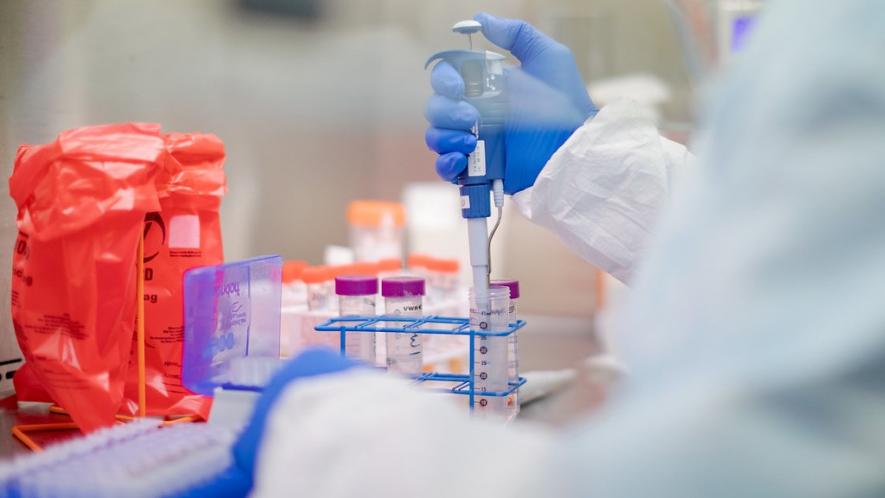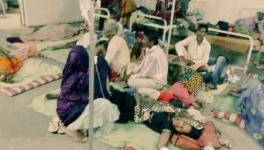Health Experts Slam Private Sector Response to Pandemic, Urge Centre to Take Control

Representational image. | Image Courtesy: flicker
Calling for the government to reign in the private health sector which has largely been missing in action, the Jan Swasthya Abhiyan (JSA) and All India People’s Science Network (AIPSN), in a joint statement, have also issued a ten-point action plan on how to enable the health care to tackle the pandemic.
As of today, the number of people affected by the novel coronavirus in India is 31, 332. The number of deaths is 1007. In the 36 days that the country has been under lockdown to contain the spread of COVID-19, the private sector has been largely inactive, and the burden has fallen on the public healthcare infrastructure.
In their statement, the civil society groups mention that “there were expectations that private hospitals and facilities would step up and make major contributions towards managing the COVID-19 pandemic.” They mention that the private sector has grown “significantly” over the last two decades due to “government subsidies and policies that actively promoted the privatisation and commercialisation of healthcare. Even under the Pradhan Mantri Jan Aarogya Yojana (PMJAY) of Ayushman Bharat, nearly two-thirds of the claims amounts have gone to the private sector. The government has also been actively pursuing policies to hand over districts hospitals to corporate ownership under public-private partnership deals. It was therefore expected that the private sector would be especially useful in critical care,” they added, mentioning that it was hoped that the private sector would plug the gaps in “non-COVID-19 related health services due to the public sector’s focus on COVID-19 care, especially making use of public financing under PMJAY.”
The JSA and AIPSN mention however that in these times, the private sector “has been missing-in-action and of the few private facilities that remain functional, many are profiteering.” They write that some places have temporarily suspended even essential healthcare services with private labs testing much lesser as compared to public labs. “Despite their much-vaunted network of labs,
they are testing only in a few metro cities, with many of their state branches refusing to test (as seen in
Chhattisgarh),” the statement added.
“Even one month after the central government fixed a very high rate of Rs.4500 per test, many
private labs that were accredited have not got activated. Irregularities in their functioning have also emerged,” the statement said. They mentioned that most people would not be able to afford testing and that the package under PMJAY for the test is not available at many hospitals and cannot be done at labs which are not empanelled.
The experts mention that private hospitals could have helped with surveillance and reporting of routine severe acute respiratory infection (SARI) or influenza like illness (ILI) cases “in order to alert the system about clusters where there may be an increase in such cases. But this would only be possible if they were providing routine services. Most for-profit private hospitals have reduced or completely shut down their out-patient and inpatient services, and therefore unable to contribute to surveillance. In fact, shutting down hospitals is a violation of Essential Services Maintenance Act (ESMA) and an abdication of their professional responsibility.”
The statement added that despite some states issuing orders for the private sector to resume their OPD services, that has not happened. Also, essential routine services have been stopped even in the public sector with many of them dedicated to COVID-19 cases. “Among those private facilities that are functioning, instances have come to the fore of denial of healthcare to patients who are suspected to be COVID-19 positive. There are reports of private hospitals evicting such patients,” they said.
The experts cited data which shows that few private hospitals are providing critical care for COVID-19 patients, and that even in those cases, there have been reports of hospitals overcharging and patients having to pay exorbitant bills.
They mention that current packages under the PMJAY scheme can be used for COVID-19 patients, however, data from the Nation Health Authority showed that the number of claims for “SARI and ILI has reduced significantly in April. This clearly shows that the private sector has stopped working on SARI and ILI cases. The deafening silence of the private sector in demanding a COVID-19 claims package under PMJAY also shows that they are not at all interested in providing these services,” they added.
With the private hospitals continuing with their “profiteering, the impact of this crisis will be felt keenly by health workers and patients,” they mentioned, adding that the government must ensure the following ten steps to control the spread of the novel coronavirus in India.
– Government needs to urgently take control of the situation and invoke its powers to bring part or all of select private hospitals, facilities and services under common public health command, at its own terms and conditions, and delegate tasks to them.
– All testing and treatment related to Covid-19 should be free of cost to the patient and available as close to district level as possible. States may reimburse private facilities as per fixed rates for their services, while taking care that it should not involve transfer of excessive public budgets to the private sector.
– For the management of mild and moderate cases, private nursing homes, hostels and hotels should be
requisitioned to serve as isolation hospitals.
– For managing critical cases, part or all of very select private sector hospitals who have such capacity could be converted into dedicated Covid-19 hospitals and brought under public authority. Such arrangements would have to be negotiated with private managements, who may continue to undertake many management and staffing functions and be reimbursed at suitable rates.
The current moves to re-purpose well functional secondary and tertiary level government hospitals, into Covid-19 hospitals by pushing out a large number of poor patients are unacceptable and must be
discontinued immediately. Where government hospitals are the only option for Covid-19 critical care, only a part of the hospital should be re-purposed, leaving other essential care in place, or as has been done in many countries, new public hospitals should be rapidly built up in available or new infrastructure.
– Clear guidelines on reporting, costing, treatment and administrative protocols should be laid out and their implementation ensured in both public and private hospitals.
– Private hospitals which are not involved in Covid-19 care must remain open and continue with all health services without increase of rates and with due precautions against spread of infection. They should strengthen notification of diseases and regular reporting of service delivery as required under clinical establishments act and disease surveillance systems
– Government should ensure and monitor that the private sector follows government guidelines for personal safety, infection risk management and the use of personal protective equipment with respect to health worker safety and to prevent spread of infection to non-Covid-19 patients. Government must also take necessary steps to ensure that these hospitals are able to access the necessary PPE and test-kits.
– Privacy and confidentiality of all patients should be maintained in the private sector, especially if they are Covid-19 patients, and no personal information should be shared with public or public authorities, except as required by law.
– A helpline for grievances, both of patients and health workers in the private sector should be started.
– As the public sector is taking most of the burden, corresponding increases in HR, minor equipment, and major equipment and skills are needed for government facilities.
The experts mention that the government should learn from “the failure of the for-profit private sector and PMJAY to provide any meaningful response during the COVID-19 epidemic and stop promoting the private healthcare sector.” They mention that health budgets need a boost and the capacity of public healthcare facilities and infrastructure should be increased. “This crisis should be a turning point in India’s health policy making, and bring back the centrality of the public health system in ensuring universal health care,” they concluded by saying.
Get the latest reports & analysis with people's perspective on Protests, movements & deep analytical videos, discussions of the current affairs in your Telegram app. Subscribe to NewsClick's Telegram channel & get Real-Time updates on stories, as they get published on our website.
























